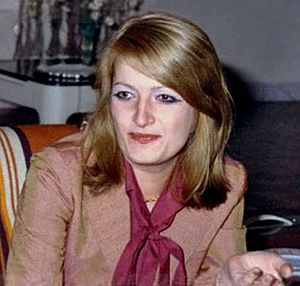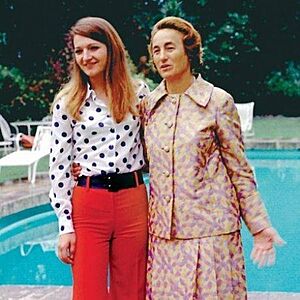Zoia Ceaușescu facts for kids
Quick facts for kids
Zoia Ceaușescu
|
|
|---|---|

Zoia Ceaușescu in 1981
|
|
| Born | 28 February 1949 |
| Died | 20 November 2006 (aged 57) Bucharest, Romania
|
| Citizenship | Romania |
| Alma mater | University of Bucharest |
| Spouse(s) | Mircea Oprean |
| Parent(s) | Nicolae Ceaușescu Elena Ceaușescu |
| Relatives | Nicu Ceaușescu Valentin Ceaușescu |
| Awards | Simion Stoilow Prize |
| Scientific career | |
| Fields | Mathematics |
| Institutions | Institute of Mathematics of the Romanian Academy INCREST |
| Thesis | On Intertwining Dilations (1977) |
| Doctoral advisor | Ciprian Foias |
Zoia Ceaușescu (born February 28, 1949 – died November 20, 2006) was a talented Romanian mathematician. She was the daughter of Nicolae Ceaușescu, who was the leader of Romania's Communist Party, and his wife, Elena. People sometimes called her Tovarășa Zoia, which means "Comrade Zoia."
Contents
Early Life and Education
Zoia Ceaușescu grew up in Bucharest, the capital city of Romania. She went to High School nr. 24, which is now known as Jean Monnet High School. She finished high school in 1966.
After high school, Zoia continued her studies at the University of Bucharest. She chose to study mathematics. She earned her Ph.D. degree in 1977. Her special research paper was called On Intertwining Dilations. Her professor, Ciprian Foias, helped her with this important work.
Career in Mathematics
After getting her Ph.D., Zoia Ceaușescu became a researcher. She worked at the Institute of Mathematics of the Romanian Academy in Bucharest. Her main area of study was functional analysis. This is a complex part of mathematics.
It is said that her parents were not happy with her choice to be a math researcher. Because of this, the Institute of Mathematics was closed down in 1975. Zoia then moved to work at a different place. It was called the Institute for Scientific and Technical Creativity (INCREST). There, she started and led a new department focused on mathematics.
In 1976, Zoia Ceaușescu received a special award. It was called the Simion Stoilow Prize. She earned this award for her excellent work and contributions to mathematics. She published 22 scientific papers between 1976 and 1988.
Personal Life
In 1980, Zoia Ceaușescu got married. Her husband was Mircea Oprean. He was an engineer and a professor. He taught at the Polytechnic University of Bucharest.
Life After the Revolution
In December 1989, a big change happened in Romania. This was the Romanian Revolution. During this time, Zoia was arrested. She was held for about eight months. She was released in August 1990.
After she was freed, Zoia tried to get her old job back at INCREST. However, she was not able to. She then decided to retire. After the revolution, the government took the house where she lived with her husband. They had to live with friends for a while.
Zoia shared some thoughts about her parents. She said that her mother had the secret police, called the Securitate, watch their children. Zoia felt this was perhaps out of "love." She also said that power had a "destructive effect" on her father. She believed he "lost his sense of judgment."
Zoia Ceaușescu passed away in 2006. She was 57 years old. She died from lung cancer.
See also
 In Spanish: Zoia Ceaușescu para niños
In Spanish: Zoia Ceaușescu para niños
 | Roy Wilkins |
 | John Lewis |
 | Linda Carol Brown |


